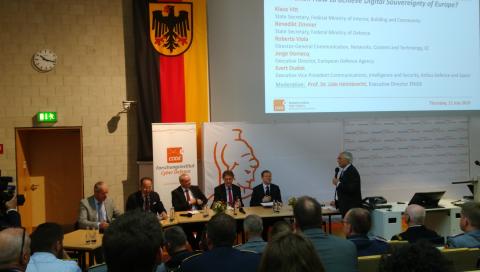Prof. Dr. Udo Helmbrecht, Executive Director of ENISA moderated on 11 July 2019 a panel at CODE’s Annual Conference in Munich.
Titled ‘How to Achieve Digital Sovereignty of Europe’, the panel saw the participation of high-level members: Klaus Vitt, State Secretary, Federal Ministry of Interior, Building and Community, Benedikt Zimmer, State Secretary, Federal Ministry of Defence, Roberto Viola, Director General, DG CONNECT, European Commission, Jorge Domecq, Executive Director, European Defence Agency, and Evert Dudok, Executive Vice President Communications, Intelligence and Security, Airbus Defence and Space.
Discussions revolved around current hot topics on the EU agenda, namely:
- What exactly is digital sovereignty? Is there a clear priority or challenge that relates to digital sovereignty in Europe?
- Are there possible mechanisms or clear responses to strengthen the EU’s position in the global digital society? Should this be driven by regulation, academic research, and/or subvention of public funding?
- From a global perspective: how should Europe respond to the current market development and strength of global tech giants from outside the EU? Should Europe create its own champions? Should Europe invest in specific niches and further intensify its innovation by using the strength of its SMEs?
- Should the EU change or develop specific regulation to support digital sovereignty? What kind of cooperation model has the most potential for success? What would be the role of government, industry and academia on local, national and European level?
On this occasion, Mr. Helmbrecht also launched ENISA’s consultation paper ‘EU ICT Industrial Policy: Breaking the Cycle of Failure’, a paper that aims to explore, amongst other topics, the area of digital sovereignty. He noted that the outcomes of this consultation will serve as input for a further publication and input into the discussions with the new European Commission and European Parliament.
The paper looks into the strengths and shortcomings of the ICT industrial policy in the EU from a cybersecurity perspective, with a view to how Europe can do better, and how the development of EU cybersecurity industry in the years to come can be rendered a success.
“The question is if and why are examples of European leadership in ICT beginning to fade. Is there insufficient coordination in relation to cybersecurity in the EU? Could resources be deployed more efficiently? These are some of the questions that are being presented for discussion. We look forward to receiving your input into this consultation”, said Mr. Helmbrecht.
Secondly, ENISA also gave a workshop at the conference on ‘Challenges and Application of Threat Intelligence’ introducing our CTI Capability Framework and Maturity Model in the annual threat landscape report.
Finally, ENISA’s Head of Core Operations, Steve Purser moderated the workshop ‘Digital Souvereignty - A Must for Europe’ which provided a discussion on how a policy shift can be achieved and how we can move towards a more competitive and more digitally sovereign European ICT sector.

